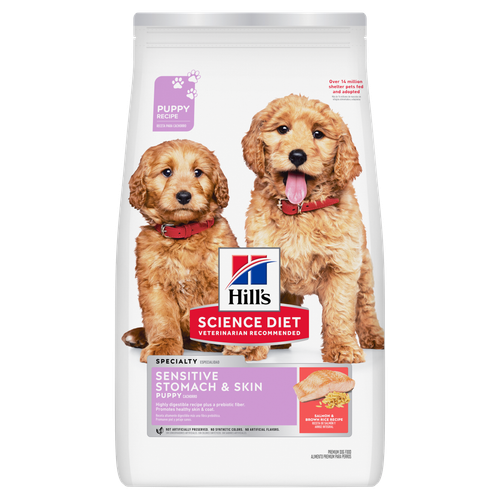
-
Find the right food for your petTake this quiz to see which food may be the best for your furry friend.Find the right food for your petTake this quiz to see which food may be the best for your furry friend.Featured products
 Puppy Sensitive Stomach & Skin Salmon & Brown Rice Recipe
Puppy Sensitive Stomach & Skin Salmon & Brown Rice RecipeDelicious, highly digestible recipe, gentle on stomachs. Nourishes skin & promotes a lustrous coat
Shop Now Adult Chicken & Barley Recipe Dog Food
Adult Chicken & Barley Recipe Dog FoodSupports lean muscle and beautiful coat for adult dogs
Shop Now Puppy Large Breed Chicken & Brown Rice Recipe
Puppy Large Breed Chicken & Brown Rice RecipeVital nutrients to support 5 essential building blocks for lifelong health
Shop NowFeatured products Adult Urinary Hairball Control Chicken & Rice Recipe Cat Food
Adult Urinary Hairball Control Chicken & Rice Recipe Cat FoodActively supports the health of the whole urinary system
Shop Now Adult 7+ Chicken Recipe Cat Food
Adult 7+ Chicken Recipe Cat FoodSupports energy level and beautiful fur in mature cats
Shop Now Kitten Chicken Recipe
Kitten Chicken RecipeVital nutrients to support 5 essential building blocks for lifelong health
Shop Now -
Dog
- Dog Tips & Articles
-
Health Category
- Weight
- Food & Environmental Sensitivities
- Urinary
- Digestive
- Joint
- Kidney
-
Life Stage
- Puppy Nutrition
- Adult Nutrition
- Senior Nutrition
Cat- Cat Tips & Articles
-
Health Category
- Weight
- Skin & Food Sensitivities
- Urinary
- Digestive
- Kidney
-
Life Stage
- Kitten Nutrition
- Adult Nutrition
Featured articles The Incredible Science Behind Your Pet's Microbiome
The Incredible Science Behind Your Pet's MicrobiomeLearn what a pet's microbiome is, how it contributes to your pet's gut & overall health, and why nutrition is important in maintaining healthy microbiomes.
Read More Water
WaterDiscover why water is the most important nutrient for your dog or cat to live a healthy life. Find out how much water your pet should consume each day.
Read More Pet Food Storage Tips
Pet Food Storage TipsDiscover how and where to store your dry, as well as canned, dog and cat food. Learn how to find the "best before" dates on all Hill's pet food packaging.
Read More -


The threat of free radicals
Cells are continually under attack from compounds called 'free radicals'. Generated as a 'by-product' of the body's own metabolism or as a result of external factors like pollution, free radicals can kill cells by damaging the membrane, the enzymes and the DNA contained within. Free radicals pose a particular risk to the cells of the nervous and immune systems, and they are even thought to contribute to the progression of many diseases and the onset of premature ageing.
How antioxidants help
Antioxidants help prevent the free radicals from damaging cells. Whilst the body's normal antioxidant defenses provide some protection, the addition of antioxidants to the diet provides an additional 'active shield' that supports those natural defenses.


Tasty Tips
Young pets may need several visits in their first year for vaccinations. Adult pets generally benefit from annual check-ups, while senior or special-needs pets might require more frequent visits.
Clinically proven antioxidants
Hill's pet foods contain a unique combination of antioxidants such as vitamins E and C, beta-carotene and selenium, and that superior antioxidant formula has been clinically proven to help maintain your pet's health, reduce the risk of disease and strengthen the immune response.
Protecting puppies and kittens
Because puppies and kittens are particularly at risk from free radicals, Hill's pet foods contain antioxidants clinically proven to help build healthy immune systems right from the start.


One of our staff authors prepared this article for you
Related products

Supports energy level and beautiful fur in mature cats

Vital nutrients to support 5 essential building blocks for lifelong health

Delicious, highly digestible recipe, gentle on stomachs. Nourishes skin & promotes a lustrous coat

Vital nutrients to support 5 essential building blocks for lifelong health
Related articles

Discover how and where to store your dry, as well as canned, dog and cat food. Learn how to find the "best before" dates on all Hill's pet food packaging.

Discover why water is the most important nutrient for your dog or cat to live a healthy life. Find out how much water your pet should consume each day.

Discover how antioxidants fight against free radicals in your dog or cat's body, and why they are so important to your pet's diet.

Learn what a pet's microbiome is, how it contributes to your pet's gut & overall health, and why nutrition is important in maintaining healthy microbiomes.

Put your pet on a diet without them knowing
Our low calorie formula helps you control your pet's weight. It's packed with high-quality protein for building lean muscles, and made with purposeful ingredients for a flavorful, nutritious meal. Clinically proven antioxidants, Vitamin C+E, help promote a healthy immune system.
Put your pet on a diet without them knowing
Our low calorie formula helps you control your pet's weight. It's packed with high-quality protein for building lean muscles, and made with purposeful ingredients for a flavorful, nutritious meal. Clinically proven antioxidants, Vitamin C+E, help promote a healthy immune system.

